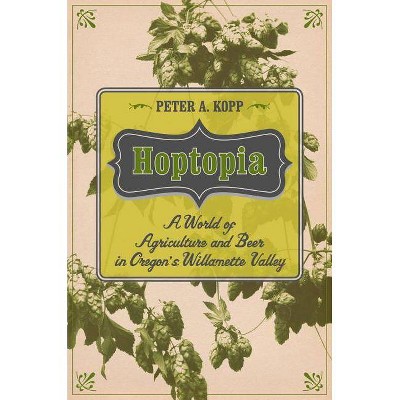Hoptopia, 61 - (California Studies in Food and Culture) by Peter A Kopp (Paperback)

Similar Products
Products of same category from the store
AllProduct info
<p/><br></br><p><b> About the Book </b></p></br></br>"Hoptopia argues that the current revolution in craft beer is the product of a complex global history that converged in the hop fields of Oregon's Willamette Valley. What spawned from an ideal environment and the ability of regional farmers to grow the crop rapidly transformed into something far greater because Oregon farmers depended on the importation of rootstock, knowledge, technology, and goods not only from Europe and the Eastern United States but also from Asia, Latin America, and Australasia. They also relied upon a seasonal labor supply of people from all of these areas as a supplement to local Euroamerican and indigenous communities to harvest their crops. In turn, Oregon hop farmers reciprocated in exchanges of plants and ideas with growers and scientists around the world, and, of course, sent their cured hops into the global marketplace. These global exchanges occurred not only during Oregon's golden era of hop growing in the late nineteenth and early twentieth centuries, but through to the present in the midst of the craft beer revival. The title of this book, Hoptopia, is a nod to Portland's title of Beervana and the Willamette Valley's claim as an agricultural Eden from the mid-nineteenth century onward. But the story is fundamentally about how seemingly niche agricultural regions do not exist and have never existed independently of the flow of people, ideas, goods, and biology from other parts of the world. To define Hoptopia is to define the Willamette Valley's hop and beer industries as the culmination of all of this local and global history. With the hop itself as a central character, this book aims to connect twenty-first century consumers to agricultural lands and histories that have been forgotten in an era of industrial food production"--Provided by publisher.<p/><br></br><p><b> Book Synopsis </b></p></br></br>The contents of your pint glass have a much richer history than you could have imagined. Through the story of the hop, <i>Hoptopia</i> connects twenty-first century beer drinkers to lands and histories that have been forgotten in an era of industrial food production. The craft beer revolution of the late twentieth century is a remarkable global history that converged in the agricultural landscapes of Oregon's Willamette Valley. The common hop, a plant native to Eurasia, arrived to the Pacific Northwest only in the nineteenth century, but has thrived within the region's environmental conditions so much that by the first half of the twentieth century, the Willamette Valley claimed the title "Hop Center of the World." <i>Hoptopia</i> integrates an interdisciplinary history of environment, culture, economy, labor, and science through the story of the most indispensible ingredient in beer.<p/><br></br><p><b> From the Back Cover </b></p></br></br>"Everyone who enjoys beer, especially craft beer, should read this book. Deeply researched and captivatingly written, Kopp's book is an education in the global transformations that made possible the Americas' revolution in beer. <i>Hoptopia </i>will change how readers think and--most importantly--how they taste their favorite hoppy beers."--Mark Fiege, Montana State University <p/> "Peter Kopp has produced a masterful work in <i>Hoptopia</i>. He creatively brings together agriculture, agronomy, science, environment, labor, and market economics to tell this story of hop production in Oregon's Willamette Valley. What's beer without hops? What's the history of that crop without all of the important connections explained so well here? <i>Hoptopia</i> is a must-have book for all interested in the history of the Pacific Northwest and for all who love beer."--Sterling Evans, University of Oklahoma <p/> "<i>Hoptopia</i> finally encapsulates the noble role of the lowly hop cone in the world of quality beer. Peter Kopp deftly weaves the story of how American hops--and particularly Oregon hops--went from a laughingstock of the beer world to an ingredient highly sought after by brewers worldwide. Cheers to <i>Hoptopia</i>!"--Karl Ockert, Director of Brewery Operations, Deschutes Brewery <p/> "Imagine a Venn diagram with hops, a crucial ingredient in making beer, in the center, attached to circles containing farming, agronomy, climate, ecology, business, labor, gender, race, class, festivals, globalization, and utopias. As the title of Peter Kopp's entertaining and informative history of hop farming suggests, the story of hops is regional history placed in contexts of world history. Like the beers that hops make palatable, this book nourishes and stimulates. Imbibe!"--Bernard Mergen, author of <i>At Pyramid Lake</i> <p/> "Peter Kopp has taken seriously the advice of many environmental historians to begin with the natural world and ask questions about human engagement. In this fascinating history of a plant and its place in the Pacific Northwest, we get everything from transnational economic competition to indigenous labor to modern bio-scientific research--and all of it also packaged to give us a new viewpoint on the world's most popular alcoholic beverage."--William L. Lang, Portland State University <p/> "Cheers to this fascinating agricultural history of the aromatic hops that infused America's craft beer revolution. Kopp relates the rich biological, scientific, social, labor, and industrial history of the development of Oregon's Willamette Valley as a major hop producer. Along the way, he reveals the complex connections between global markets and the local landscapes and people who transformed the way many of us imbibe beer."--Marsha Weisiger, Julie and Rocky Dixon Chair of U.S. Western History, University of Oregon <br><p/><br></br><p><b> Review Quotes </b></p></br></br><br>"Peter Kopp's first book is a work of stunning originality. <i>Hoptopia</i> weaves global and local history, environmental and food studies, culture, economics, business, labor, tourism, and regional identity into a bine as impressive as the climbing hops plants that Pacific Northwesterners know so well."-- "Oregon Historical Quarterly"<br><br>"Peter Kopp digs into the history and agriculture of growing hops for beer. He begins with the ancient development of the vine, explores how it came to be used to preserve beer and how it has grown into the craft beer flavor factor to the nth degree. . . . Fascinating."-- "OnMilwaukee.com" (10/18/2016 12:00:00 AM)<br><br>"Peter Kopp provides us with a delightful and readable historical account of the Willamette Valley's hops and beer industry."-- "Pacific Northwest Quarterly" (12/31/2016 12:00:00 AM)<br><p/><br></br><p><b> About the Author </b></p></br></br><b>Peter A. Kopp</b> is Assistant Professor of History at New Mexico State University, where he also serves as Director of the Public History Program.
Price History
Price Archive shows prices from various stores, lets you see history and find the cheapest. There is no actual sale on the website. For all support, inquiry and suggestion messagescommunication@pricearchive.us




















